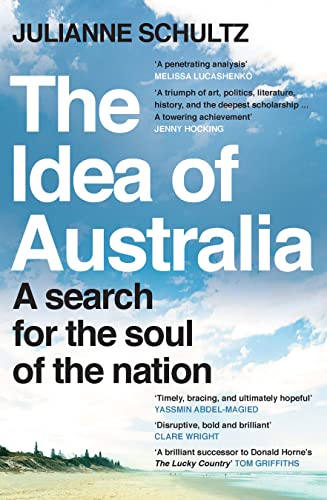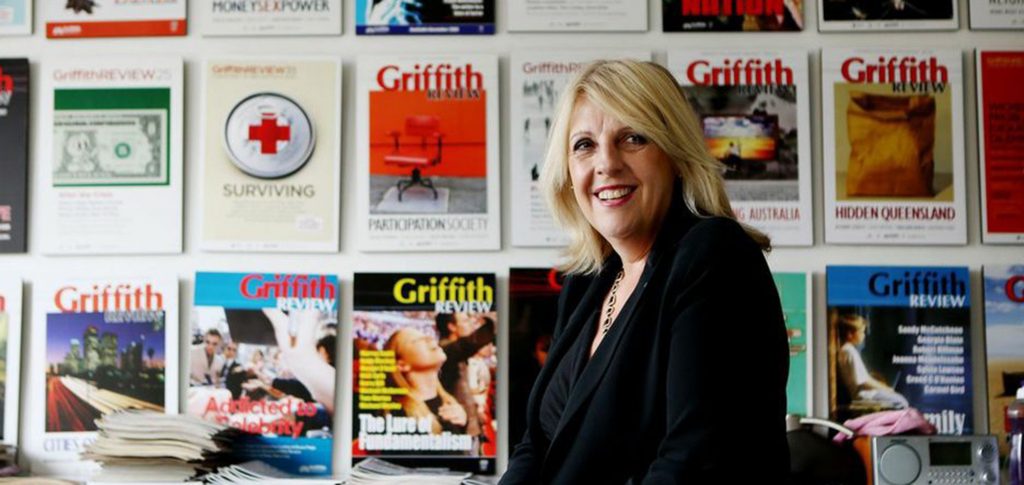‘What’s the Idea? Still searching for the soul of the nation’, Honest History, 23 August 2022
I don’t propose to do a review of Julianne Schultz’s, The Idea of Australia: A Search for the Soul of a Nation, mostly because there have been so many reviews of it already (see below). I’ve read the book, though, and I still want to make some points about it, because it is imaginative and stimulating, it is highly recommended by people whose views I respect (Yassmin Abdel-Magied, Frank Bongiorno, Ann Curthoys, Tom Griffiths, Kerry O’Brien, Christine Wallace, Clare Wright, and others), and it stands its ground strongly against writers in the ‘Straya Gee Whiz genre (Peter FitzSimons, Paul Ham, Roland Perry, Graham Seal, Bill Wannan, and such).
 I’m just not convinced that our nation – or any nation for that matter – can be distilled into a single ‘idea’, that it has a ‘soul’ in the sense of an ‘essence’ or ‘spirit’ or ‘defining nature’ – Schultz’s terms on page 1 of the book. She wants a ‘definition of a nation that is more than a place’ but then goes searching all over the place Australia for that elusive essential something or ‘numen’ (not her word, but a fancy Latin one meaning ‘spirit of the place’). Indeed, having read Schultz’s first chapter closely, I didn’t think she expected to find that single essence or spirit.
I’m just not convinced that our nation – or any nation for that matter – can be distilled into a single ‘idea’, that it has a ‘soul’ in the sense of an ‘essence’ or ‘spirit’ or ‘defining nature’ – Schultz’s terms on page 1 of the book. She wants a ‘definition of a nation that is more than a place’ but then goes searching all over the place Australia for that elusive essential something or ‘numen’ (not her word, but a fancy Latin one meaning ‘spirit of the place’). Indeed, having read Schultz’s first chapter closely, I didn’t think she expected to find that single essence or spirit.
She’s right. I reckon we’d sell ourselves short if we plumped for our essence in one place – Anzac Cove (please, No!), Bondi Beach, the Franklin River, the Shane Warne Stand, even Uluru; they are all places most of us have never been. (There is, however, an inspired, generic list on page 31 that will ring bells for most readers.) Even if we extended the range of possibilities from physical places to states of mind – the birth of one’s child, the love of family, shared endeavour to save one’s home from fire or flood, or just that feeling you get ‘putting the feet up’ when ‘knackered’ – I’m not sure we’d get much further.
All of these candidates mean something to some of us, but just to knock up random lists like these conveys the inadequacy of the concepts of ‘soul’ or ‘idea’ when applied to something as complex as a country of 26 million people, 60,000 years of history, and hundreds of species of flora and fauna. When the Anzackery crowd have burbled about the Australian War Memorial containing ‘the soul of the Nation’, my response has been that surely Australia’s soul, or bits of it, can be found wherever there are Australians. That’s still a good idea, no matter what the putative location for our soul.
Broadening the search to desirable or unique Australian qualities, we might add ‘Anzac Spirit’ (again, please, No!), ‘Easy-going informality’, ‘Fair Go’, ‘Mateship’, ‘multiculturalism’, and ‘Good old Australian vitality’. Some of us show some of these attributes some of the time but so do folks living in many, many countries that are not Australia. Some of those attributes can even be made fun of.
Even if Schultz doesn’t really believe there is a single soul or single Idea, she certainly enjoys the search for them. That is really the point of the book: the journey not the destination. And Schultz’s journey is filtered, as it must be for all of us, through the lens she inherited, in her case as the exploring, thoughtful daughter of an often relocated Lutheran pastor and his wife.
Schultz gives plenty of signposts in her early chapters, while pointing to the contradictions and potential conflicts characteristic of our Wide Brown Land. One list on page 8 has ‘dynamism and openness, caution and censoriousness’, ‘labour and capital’, ‘men and women’, ‘black and white’, ‘immigrants and native born’, ‘conservationists and developers’. All fairly obvious, but just to list them as potentially contesting cautions us against too easily unravelling single strands in our psyche. ‘By exploring different ideas of Australia’, Schultz says on page 13, ‘I hope to trigger conversations’ about pathways to the future, but she rightly points out (page 29) how ‘any debate that required a moral core – climate change, population, refugees, diversity, human rights, First Nations recognition – had been shut down by hectoring bullies’.
I would add that, too often the hectoring has morphed into a sentimental nationalism – built around Anzac or a version of it – as the ubiquitous glue, or ‘an unquestionable article of faith’, as Schultz describes it on page 358. Even the mildest of questioners, like Yassmin Abdel-Magied in 2017, provoked the bullying response of boofhead Anzackers, instead of the willingness to contest and debate that characterises mature adults.
Schultz’s twenty chapters contain many highlights but I personally found her frequent returning to the pandemic, and how Australians dealt with it, one of the most interesting parts of the book. She found encouragement from the way communities responded to COVID, how they showed ‘society was not a fiction’ (page 406). Beyond the pandemic, she found inspiration in First Nations. Despite the best efforts of settler-invader Australians to ensure that Indigenous Australians were indeed a ‘dying race … they have survived. Theirs is arguably the greatest national achievement (page 409).’
Schultz ends the book with a call for boldness. ‘Platitudes and myths are not enough … The soul of the nation has a rich inner life. It holds the dreams and stories of those who have always been here and those who have come in waves ever since (page 416).’ That is having a bit both ways – a national soul that holds many dreams and stories – but it works for me.
Those other reviews then: Crikey (Guy Rundle); Market Herald (Tim Dunlop); Music Trust (Barry Conyngham); Queensland Reviewers Collective (Richard Tutin); Resident Judge of Port Phillip; Sydney Morning Herald (Michael McGirr). The author talks about the book: ABC Late Night Live; Australian Council for the Moving Image; National Library of Australia. Extracts from the book: Crikey; Guardian Australia. I reckon the most perceptive review is McGirr’s, which ends thus:
Many of the issues in The Idea of Australia are uncomfortable, all the more so because of their resilience in the face of opportunities to do better. There are snakes in the undergrowth of Australian history that refuse to die. Although Schultz has many trenchant criticisms, not to mention a long memory, there is not a shred of cynicism in this book. It is long on disappointments. But it is not without hope. It wants to find both the language and social structures that would tell a different story.
Julianne Schultz (ACMI/Griffith Review)
Whether Schultz’s book is, as some of its puffs claim, the successor to Donald Horne’s The Lucky Country (1964), hardly matters. That book came out so long ago I can’t even recall reading it, though I remember Donald Horne as a congenial colleague at UNSW in 1974. He was always spinning off new ideas, always willing to engage, always encouraging of tyroes, always friendly. I’ve not met Schultz but I reckon she and her ideas would be interesting company, too. Let’s hope she keeps searching for our soul(s).
*David Stephens is editor of the Honest History website. He is also co-editor (with Alison Broinowski) of The Honest History Book (2017), to which Julianne Schultz was kind enough to contribute a thoughtful Foreword. Honest History has also reviewed (use our Search function) a number of editions of the Griffith Review, a journal which is Schultz’s proudest editorial achievement.



Leave a Reply
You must be logged in to post a comment.